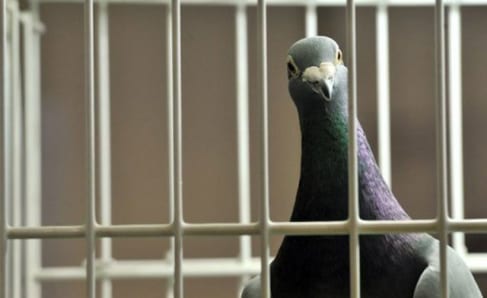
by Pigeon Patrol | Jul 20, 2023 | Bird Spike, Pigeon Predators, Pigeon Spikes, Pigeons, Pigeons in the News, Raccoons, Sparrows, UltraSonic Bird Control
Sick of sea gulls? Petrified of pigeons? Bothered by birds? Have you been stepping in excessive amounts of bird poo around your home or business?
This guide is packed full of everything you need to know about bird management in the UK. The guide includes why we sometimes have to control birds, how to deter birds, and how to get rid of them if you have an infestation.
Whether you’re thinking about doing some DIY bird control or you’re looking to enlist the help of a professional bird management company, this guide is for you.
We love British birds. Every wild bird and their eggs in the UK is rightfully protected by law under the Wildlife and Countryside Act 1981.
There are hundreds of species of birds in the UK. Having birds visit your garden is a wonderful treat, and we’re all happy to see them.
Unfortunately, a few species of birds come into direct conflict with humans when they take roost in or around our homes or businesses. These birds can cause real problems, including excessive nuisance and public health concerns.
Urban birds such as gulls and pigeons are great opportunists. Handed a ready food source and sheltered nesting site, these birds can grow rapidly and what initially attracted a few birds can soon become a thriving colony.
That’s when a professional can step in and help you control and manage pest birds.
The dangers: why control birds?
Pathogens and diseases
There are more than 110 pathogens reportedly carried by pigeons, and there is plenty of research to suggest other wild birds pass on diseases to humans.
Some of the more common diseases and pathogens that birds can spread:
| Air-borne diseases |
Food-borne disease |
| Chlamydia psittaci (Ornithosis) |
Salmonella spp. |
| Cryptococcus neoformans |
Escherichia coli |
| Histoplasma capsulatum |
Campylobacter jejuni |
| Allergenic particles (bird fancier’s lung) |
Listeria monocytogenes |
|
Vibrio cholerae |
In 2019, two patients died in a Glasgow hospital who had contracted a cryptococcal fungal infection which was subsequently linked to pigeon droppings.
Diseases can be transmitted from bird droppings and the birds themselves.
When dry, pigeon droppings can become airborne in small particles, which can lead to respiratory complaints.
You should always wear appropriate personal protective equipment (PPE) when cleaning up bird droppings.
Food-borne bacteria can be spread to humans if you have poor food hygiene standards or come into direct contact with droppings (wash your hands straight away)!
Pigeons, gulls, house sparrows and starlings have the potential to carry food-borne diseases – it is therefore essential to keep them away from food manufacturers and distributors.
Safety concerns
All bird droppings can be slippery and can cause a serious risk on pavements, particularly under roosting birds.
As funny as it might seem to see a gull steal someone’s chips at the seaside, gulls can pose a serious safety concern.
During the breeding season, gulls have been known to attack people unprovoked. Gulls have the potential to startle and even draw blood when they attack.
All birds have the potential to cause real problems on airfields. When birds are sucked into plane engines (bird strikes) – while rarely fatal – they can cause damage to aircraft and emergency landings.
Damage to property and brickwork
Bird droppings are acidic and can corrode and erode metals, stonework and brickwork.
Nesting materials birds use can block chimneys, flues and guttering, causing possible issues with carbon monoxide and damage to buildings as water overflows from blocked gutters.
Buildings covered in fouling looks unpleasant, can smell, and projects a poor image of a business, potentially ruining an organisation’s reputation. If customers spot evidence of a bird infestation on your premises, they may not want to do business with you.
A professional pest management company can help protect your building using proofing and bird deterrent measures.
Secondary insect infestations
Where birds go, so too go the parasites that live on them. Bird mites, ticks, fleas and beetles can all cause complicated secondary infestations.
If you have a current or past problem with birds, you may find you’ll suffer from a parasite infestation too.
These little critters can quickly multiply into thousands, leaving you feeling overwhelmed.
The relentless biting, itching, crawling sensation and lack of sleep are the physical symptoms that can propagate a whole host of secondary mental health issues.
Bird mites are parasitic arthropods feed on living organisms. It is the female mite that needs a blood meal to reproduce viable eggs. They are attracted to mammals by receptors for moisture, heat and CO2, and they often bite humans when their original food source has gone – like when the young birds leave the nest.
If you have a parasite issue because of a bird infestation, contact a professional pest management company as soon as possible.
Birds around businesses
If you have birds roosting in and around your business then you’ll want to seek professional help as soon as possible.
In the UK, allowing birds to infest a food business violates the Food Safety (General Food Hygiene) Regulations 1995, and could result in prosecution of the food company.
If you don’t address health and safety hazards, you could be putting your staff and customers at risk.
By investing in a professional bird management contract, you can save money in the long run by reducing damage to your property or stock.
The reputational damage caused by a bird infestation can be catastrophic. Bird droppings make any business appear unclean and imply a state to disrepair.
Would you choose to use a company covered in dangerous poo?
Find a professional to help stop bird infestations at your work and protect your business today.
Birds control licences and the law
The Wildlife and Countryside Act 1981 protects all wild birds, their nests and eggs.
However, specific exemptions permit certain species to be controlled by particular methods for specific reasons.
This exemption is given in the way of a wildlife licence issued by Natural England, Natural Resources Wales, Scottish Natural Heritage or Department of Agriculture, Environment and Rural Affairs.
General licences are issued to allow certain actions to be carried out that would otherwise be illegal under the legislation, without the need for people to apply for a specific licence.
Individual licences are sometimes granted for specific situations not covered by a general license. These do need to be applied for.
The law only allows competent people such as professional pest controllers to deal with certain species.
You should always consult with a professional before you consider any form of bird control measures, as the list of birds that are considered pests can change regularly.
You can be prosecuted in the UK if you illegally interfere with a bird, it’s nests or eggs and you’re not doing under a wildlife licence.
Signs of a bird infestation
What do you need to look out for to spot a bird infestation? Some bird species like pigeons and gulls have adapted to live around us.
By their nature, birds will normally be at height keeping away from us.
Here are the seven signs that you have a bird problem:
- Spotting lots of birds settling on roofs or ledges
- Loud bird noises and cries from young chicks
- Finding nesting materials thrown about your home of business
- Damaged stock from pecking
- Bird fouling/droppings
- Blocked guttering and drainage systems with feathers and nest materials
- Secondary infestations from bird parasites (such as bird mites).
Types of birds that can be a pest
While most species of birds coexist with humans and rarely come into conflict with us, some species of birds in certain situations are considered pests.
It’s important to note that even species typically considered “pest birds” are protected by law.
Control of feral pigeon (Columba livia)
The feral pigeon is a widespread pest bird found in cities, towns and rural settings in the UK and around the world.
Pigeons can harbour a large variety of diseases and insects on their bodies. Its nests and fouling are also public health concerns.
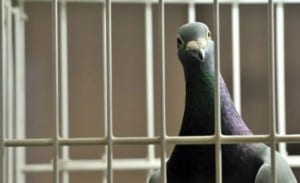
Biology of a pigeon
Feral pigeons originally descended from domesticated rock doves. The population is supported by escaped racing pigeons.
Pigeons usually make their nests in bridges, buildings or any structures with easily accessible shelter.
Males and females help build nests out of grass, twigs, features and even litter such as plastics and wire. The nests can be quite large and quickly become thick with droppings.
Depending on breeding conditions, pigeons can have up to seven broods (birds produced at one hatching) in their breeding season between March and July.
Two eggs hatch in around 18 days. With access to enough food, the young pigeons will become independent adults in just 30 days.
More eggs can be hatched before the young have even left the nest, meaning a population can quickly grow.
Wild pigeons will live up to four years, relying on human food scraps and spillages, or taking from newly sown farmland.
Behaviour of a pigeon
You’ll often see pigeons in town centres feeding in huge flocks, ranging in size from 50 to 400-plus birds.
Pigeons have a social order, so the more dominant birds feed first and get the best breeding sites.
Management and control of pigeons
The best way to get rid of pigeons is to remove a food source.
Cover bins, clean up spillages and restrict access to food. Most importantly – don’t feed the pigeons!
Proofing with nets, spikes and mesh can stop pigeons perching and roosting in structures.
Scaring techniques rarely work with pigeons. Visual and audio scaring doesn’t tend to work very well or for very long. Pigeons adapt very quickly to new things.
Flying birds of prey regularly can be useful.
Lethal control can be an option when a bird has entered a food premises or overcome the proofing measures.
Culling pigeons to reduce flock sizes is rarely successful unless access to food is restricted, otherwise population numbers soon recover. This should only ever be done as a last resort and in accordance with a wildlife licence (general or individual) issued by an appropriate government department.
How to prevent and deter birds
All urban birds require is:
- A nesting/ roosting sites (eg balconies, window ledges and roof areas of surrounding buildings)
- A reliable food source.
Removing bird food sources or blocking off sites where they perch or roost is the best way to prevent birds causing a problem.
The number of birds attracted to an area will depend on what food is available.
All of these methods of proofing have their merits and some can offer a stronger and more lasting deterrent, but as with any method of control, they may become less effective over an extended period of time.
Flying a bird of prey can be a great way of deterring birds from a certain area.
For a heavy bird infestation, your professional contractor may have to employ methods of control such as egg and nest removal, shooting, trapping or flying of predatory birds.
Therefore if birds are being fed, more will be attracted to that area, so food sources must be kept to a minimum. Keep your bin lids closed and cover compost bins.
Source
Pigeon Patrol Products & Services is the leading manufacturer and distributor or bird deterrent (control) products in Canada. Pigeon Patrol products have solved pest bird problems in industrial, commercial, and residential settings since 2000, by using safe and humane bird
deterrents with only bird and animal friendly solutions. At Pigeon Patrol, we manufacture and offer a variety of bird deterrents, ranging from Ultra-flex Bird Spikes with UV protection, Bird Netting, 4-S Bird Gel and the best Ultrasonic and audible sound devices on the market today.
Voted Best Canadian wholesaler for Bird Deterrent products ten years in a row.
Contact us at 1 877-4-NO-BIRD,(604) 585-9279 or visit our website at www.pigeonpatrol.ca
Pigeon/Pigeon Patrol / Pigeons Roosing / Vancouver Pigeon Control / Bird Spikes / Bird Control / Bird Deterrent / PIgeon Deterrent / Surrey Pigeon Control / Pest / Seagull deterrent / Vancouver Pigeon Blog / Birds Inside Home / Pigeons in the cities / Ice Pigeons / What to do about pigeons / sparrows, Damage by Sparrows, How to Keep Raccoons Away, Why Are Raccoons Considered Pests / De-fence / Pigeon Nesting / Bird Droppings / Pigeon Dropping / woodpecker control / Professional Bird Control Company / Keep The Birds Away / Birds/rats/seagull/pigeon/woodpecker/dove/sparrow/pidgeon control/pidgeon problem/pidgeon control/flying rats/pigeon problems/ bird netting/bird gel/bird spray/bird nails/bird guard
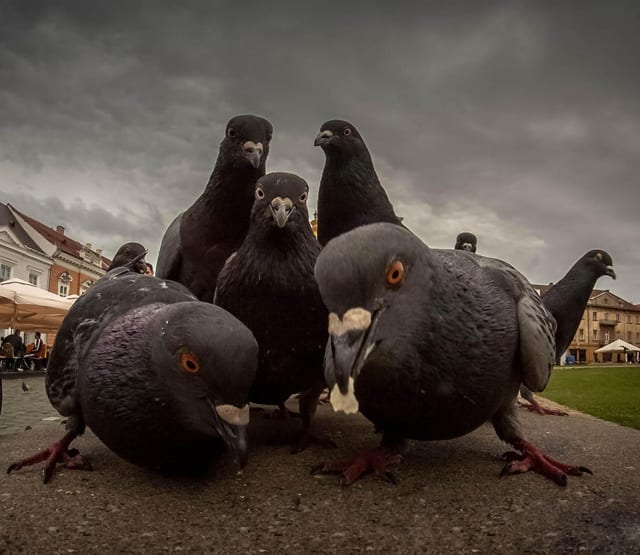
by Pigeon Patrol | Jul 6, 2023 | Bird Spike, Pigeon Predators, Pigeon Spikes, Pigeons, Pigeons in the News, Raccoons, Sparrows, UltraSonic Bird Control
A number of pigeons found dead in traps along SkyTrain routes in Vancouver have sparked concern from the public, but the pest control company that runs these traps says it has nothing to do with neglect.
Commuter Zahra Ahmdz started a petition against transit operator TransLink in the summer of 2021 after noticing the traps inside the Stadium-Chinatown station on her way to work, and what she said was very clearly multiple dead pigeons inside.
“It was very, very shocking. I didn’t think this would happen in Canada,” she said.
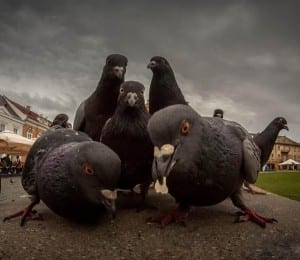
The traps are one of several methods TransLink uses to control the population of pigeons at SkyTrain stations, but the birds are never supposed to die inside. TransLink hires a pest control company to check the traps once a week, ensure there is adequate food and water inside and humanely kill any birds captured.
Media relations advisor Thor Diakow said it’s possible some pigeons did die inside the cages last summer, as TransLink was between pest control companies and didn’t maintain the cages itself in the meantime.
Ahmdz said the problem didn’t stopped there though.
Photos she said she took in March and May appear to show more dead pigeons inside the cages. And Ahmdz said after she complained to TransLink and the BC SPCA, small barriers were erected making it more difficult for her to see the birds.
“This is cruelty,” Ahmdz said.
Pest control company claims no neglect
The pest control company in charge of the cages disagrees. Atlas Pest And Wildlife Control has been working for TransLink since around November or December 2021, according to its president Raymond Arthurs. He readily admitted that they sometimes find pigeons dead inside the cages during their weekly checks, but said it’s not because of neglect on their part.
“Sometimes a hawk will get inside and kill them,” Arthurs said. “That’s kind of all natural.”
As for the barriers, Arthurs said they’re partially to stop people from tampering with the cages and partially to protect the birds from water dripping from the ceiling or other elements.
He said if the weather drops below zero, they leave the cages open as they know the water bowls inside will freeze over. They don’t have a system in place yet for hot weather, as they haven’t worked a summer for TransLink yet, Arthurs added.
He said he couldn’t comment on the exact number of pigeons that have died in his company’s cages. They keep weekly records of their activities, but Arthurs said only TransLink can decide who to provide them to. TransLink agreed to give them to Black Press Media, but said they weren’t available at the time of publication.
A move toward birth control
Both emphasized that they are starting to move away from traps and towards birth control methods.
The BC SPCA pushed TransLink to pilot test OvoControl birth control in several stations for 18 months in 2019 and 2020 after similar complaints about trapped pigeons were brought forward.
BC SPCA chief scientific officer Sara Dubois said the results were exactly what they expected – the population stabilized. She said she was disappointed when TransLink chose not to continue with the long-term solution.
More than a year later though, Diakow said TransLink is now recommitting to the method and will have permanent OvoControl dispensers in some SkyTrain stations come summer.
TransLink also uses bird spikes, netting and low-charge electric strips to deter pigeons from roosting in stations. Diakow said their main concern is the potential for bacterial infections from the birds’ droppings, but that pigeons are also one of a number of animals that regularly set off TransLink’s highly sensitive intrusion alarms.
In 2021, Diakow said wildlife set off the alarms 544 times, resulting in between 12 and 20 hours of transit delays. He said it’s impossible to know how many pigeons alone were responsible for.
Feeding wildlife is feeding the problem
He and Dubois said a large part of the problem is people drawing the pigeons to the stations.
“There’s these regulars that always show up and feed the birds,” Diakow said.
Often times, he said they do so just off TransLink property, so staff can’t actually do anything about it.
Dubois said she’s hopeful Vancouver’s new bylaw banning feeding wildlife in city parks could help, though. She said she’d like to see TransLink work with bylaw on solutions.
Diakow said they’re looking into putting up signage at the stations.
Source
Pigeon Patrol Products & Services is the leading manufacturer and distributor or bird deterrent (control) products in Canada. Pigeon Patrol products have solved pest bird problems in industrial, commercial, and residential settings since 2000, by using safe and humane bird
deterrents with only bird and animal friendly solutions. At Pigeon Patrol, we manufacture and offer a variety of bird deterrents, ranging from Ultra-flex Bird Spikes with UV protection, Bird Netting, 4-S Bird Gel and the best Ultrasonic and audible sound devices on the market today.
Voted Best Canadian wholesaler for Bird Deterrent products ten years in a row.
Contact us at 1 877-4-NO-BIRD,(604) 585-9279 or visit our website at www.pigeonpatrol.ca
Pigeon/Pigeon Patrol / Pigeons Roosing / Vancouver Pigeon Control / Bird Spikes / Bird Control / Bird Deterrent / PIgeon Deterrent / Surrey Pigeon Control / Pest / Seagull deterrent / Vancouver Pigeon Blog / Birds Inside Home / Pigeons in the cities / Ice Pigeons / What to do about pigeons / sparrows, Damage by Sparrows, How to Keep Raccoons Away, Why Are Raccoons Considered Pests / De-fence / Pigeon Nesting / Bird Droppings / Pigeon Dropping / woodpecker control / Professional Bird Control Company / Keep The Birds Away / Birds/rats/seagull/pigeon/woodpecker/dove/sparrow/pidgeon control/pidgeon problem/pidgeon control/flying rats/pigeon problems/ bird netting/bird gel/bird spray/bird nails/bird guard
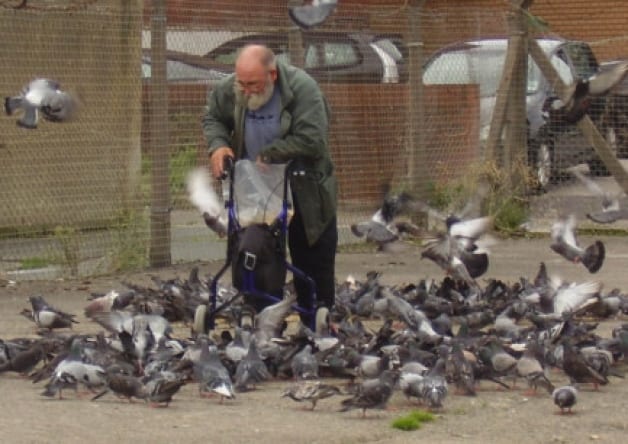
by Pigeon Patrol | Jul 6, 2023 | Bird Spike, Pigeon Droppings, Pigeon Patrol's Services, Pigeon Predators, Pigeon Spikes, Pigeons
Pigeons are often referred to as ‘rats with wings’ and like rats they have adapted well to live side by side with humans in our environment. Vast amounts of buildings and structures provide the perfect perch for pigeons to rest and our food waste and crops provide a healthy supply of food as they will eat anything they can find. Our lifestyle has eliminated any potential predators or competitors so pigeons have been allowed to thrive.
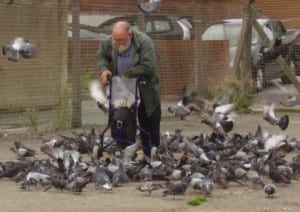
Before you try and deal with a pigeon problem on your own it is important to remember that they are not just your average pest! It requires a level of skill, expertise and a bit of imagination. A control method that works in one instance will not necessarily work in another. This is why it often requires several strategies used in unison. Whether you want to give it a go yourself or just see what options there are you will find all the pigeon control methods you need to know below.
Pigeon Control
Live Pigeon Traps – This is a highly recommended control method. Bob traps work well in most cases. Use a bait, wheat or corn will do, the birds will enter the trap through a one-way door so once inside they can’t get back out. Leave a few pigeons inside the trap as this will encourage more of these social birds into the trap. Only try this method if you are willing to kill the birds once they are caught because releasing them will not solve the problem. Call a professional pest control company if you are unsure.
Exclusion – Exclusion also known as pigeon proofing involves modifying your property to make it inaccessible to pigeons, no place to land means no pigeons! Pigeon spikes, bird slopes, bird netting, bird wires, electrified tracks and wiring can all be effective at deterring pigeons. It requires a level of skill to install thee product so it’s important to remember this before you run off to the shops and buy one of these proofing methods. Pigeon proofing can be expensive but it is also very effective and the short-term cost can save you a lot of money in the long run so it is important that they are installed properly.
Pigeon Repellents – This is a control method that makes a pigeons roosting area inhospitable without causing any harm to the bird. They are often in gel or liquid form, usually, soft, sticky or hot. It irritates the birds when they land making them fly off and find somewhere else. This is a good quick fix; these products are cheap and easy to use. However, the downside is it is only a temporary fix and can be a mess job.
Source
Pigeon Patrol Products & Services is the leading manufacturer and distributor or bird deterrent (control) products in Canada. Pigeon Patrol products have solved pest bird problems in industrial, commercial, and residential settings since 2000, by using safe and humane bird
deterrents with only bird and animal friendly solutions. At Pigeon Patrol, we manufacture and offer a variety of bird deterrents, ranging from Ultra-flex Bird Spikes with UV protection, Bird Netting, 4-S Bird Gel and the best Ultrasonic and audible sound devices on the market today.
Voted Best Canadian wholesaler for Bird Deterrent products ten years in a row.
Contact us at 1 877-4-NO-BIRD,(604) 585-9279 or visit our website at www.pigeonpatrol.ca
Pigeon/Pigeon Patrol / Pigeons Roosing / Vancouver Pigeon Control / Bird Spikes / Bird Control / Bird Deterrent / PIgeon Deterrent / Surrey Pigeon Control / Pest / Seagull deterrent / Vancouver Pigeon Blog / Birds Inside Home / Pigeons in the cities / Ice Pigeons / What to do about pigeons / sparrows, Damage by Sparrows, How to Keep Raccoons Away, Why Are Raccoons Considered Pests / De-fence / Pigeon Nesting / Bird Droppings / Pigeon Dropping / woodpecker control / Professional Bird Control Company / Keep The Birds Away / Birds/rats/seagull/pigeon/woodpecker/dove/sparrow/pidgeon control/pidgeon problem/pidgeon control/flying rats/pigeon problems/ bird netting/bird gel/bird spray/bird nails/bird guard
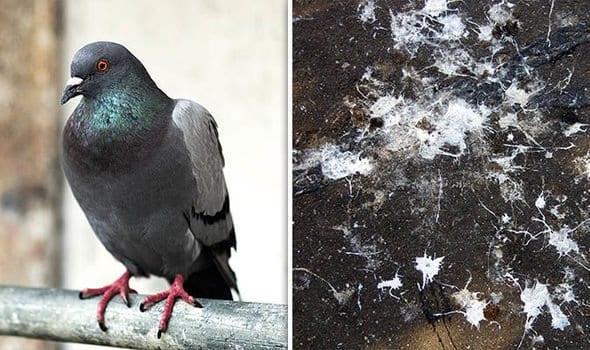
by Pigeon Patrol | Jun 30, 2023 | Bird Spike, Pigeon Predators, Pigeon Spikes, Pigeons, Pigeons in the News, Raccoons, Sparrows, UltraSonic Bird Control
If you don’t want pigeons nesting around your property, there are a number of ways you can scare them off when it looks like they might be getting comfortable.
Spray With Water
A great way to scare pigeons away without causing them any harm is to spray them with the garden hose. It’s highly unlikely they’ll appreciate getting drenched so you can guarantee they won’t hang around for long.
It’s important to do this when the birds first arrive so they know this isn’t a comfortable place to set up home. If you wait until they’ve set up a roost, not even a good soaking will get them to budge.
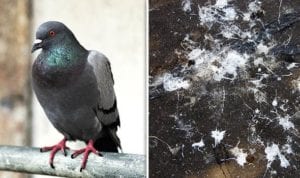
Install Scare-Pigeons
These lightweight kites are usually sold in the form of hawk silhouettes and when placed where pigeons usually roost, they’re a great scare tactic. A good tip is to move the decoy on a regular basis because pigeons will get used to its presence and won’t be scared of it anymore – especially because it doesn’t make a noise.
Use Reflective Surfaces
When the sun hits a reflective object, it creates a prism effect which interferes with pigeons’ eyesight. If your roof, balcony or windowsills are covered with anything from reflective tape to foil balloons, it’s highly unlikely they will settle. Another great way to deter pigeons from settling around your property is to hang old CDs from nearby trees or along awnings.
Install Sloped Sheathing
To keep pigeons off ledges and other flat surfaces, cover them with a sloping piece of sheet metal. If they physically can’t settle somewhere then they won’t.
When To Call A Pest Controller
The best way to deal with a pigeon problem is to call a pest controller. They will know exactly how to get rid of them and importantly, how to keep them away for good.
Pest control companies are well training on what systems to install to provide the best solution to your problem. From installing a netting system to anti-pigeon spikes, or wire systems on window ledges and leading edges.
What Won’t Work
There are many myths surrounding pigeons and how to scare them away but unfortunately, most of them are a waste of time because they simply don’t work.
- Noises – Everyone assumes that loud noises will scare these birds away but if you consider the pigeon population of London, it’s evident that this simply isn’t true. Pigeons are city birds – they’re used to loud noises and they don’t startle easily so unfortunately, no amount of noise is likely to drive them away.
- Ultrasonic Noises – Ultrasonic noise may seem like a great way to scare off pigeons but sadly, this method doesn’t work either. Ultrasonic sound waves bounce off objects, creating spots where pigeons can completely avoid the sound. Not only will you still be faced with a pigeon problem, these devices can also damage the hearing of cats and dogs.
- Ignoring the problem – Sadly burying your head in the sand won’t make these pests go away. Once they have found an Idyllic home location they will settle for life, so If left untreated the population will grow and grow, and so will the impact on your premises and surrounding area
Source
Pigeon Patrol Products & Services is the leading manufacturer and distributor or bird deterrent (control) products in Canada. Pigeon Patrol products have solved pest bird problems in industrial, commercial, and residential settings since 2000, by using safe and humane bird
deterrents with only bird and animal friendly solutions. At Pigeon Patrol, we manufacture and offer a variety of bird deterrents, ranging from Ultra-flex Bird Spikes with UV protection, Bird Netting, 4-S Bird Gel and the best Ultrasonic and audible sound devices on the market today.
Voted Best Canadian wholesaler for Bird Deterrent products ten years in a row.
Contact us at 1 877-4-NO-BIRD,(604) 585-9279 or visit our website at www.pigeonpatrol.ca
Pigeon/Pigeon Patrol / Pigeons Roosing / Vancouver Pigeon Control / Bird Spikes / Bird Control / Bird Deterrent / PIgeon Deterrent / Surrey Pigeon Control / Pest / Seagull deterrent / Vancouver Pigeon Blog / Birds Inside Home / Pigeons in the cities / Ice Pigeons / What to do about pigeons / sparrows, Damage by Sparrows, How to Keep Raccoons Away, Why Are Raccoons Considered Pests / De-fence / Pigeon Nesting / Bird Droppings / Pigeon Dropping / woodpecker control / Professional Bird Control Company / Keep The Birds Away / Birds/rats/seagull/pigeon/woodpecker/dove/sparrow/pidgeon control/pidgeon problem/pidgeon control/flying rats/pigeon problems/ bird netting/bird gel/bird spray/bird nails/bird guard
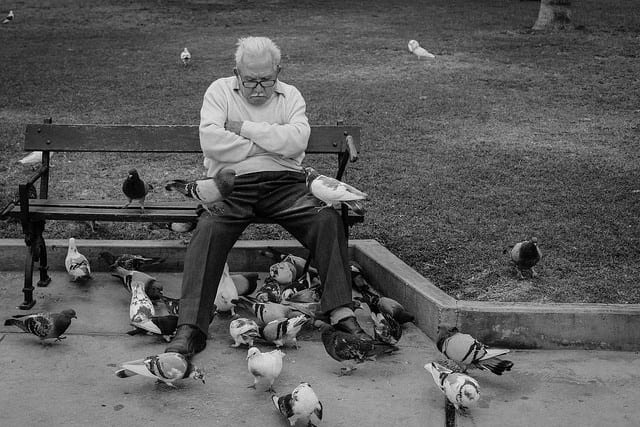
by Pigeon Patrol | Jun 30, 2023 | Bird Spike, Pigeon Predators, Pigeon Spikes, Pigeons, Pigeons in the News, Raccoons, Sparrows
From telephone wires to building ledges to public fountains, pigeons can be found nearly everywhere in a city. Unfortunately, that often means you can find them on your property, too. One pigeon may not be cause for alarm, but if pigeons have become regular visitors to your yard, you may have a problem on your hands. No homeowner wants to have to put up with these pests, but you can’t exactly just order them to leave. What should you do when you have a growing pigeon infestation? Here’s what you need to know.

How Can I Tell if I Have a Pigeon Problem?
Much of the time, pigeon infestations are impossible to miss. Pigeons are relatively large, and their sounds are difficult to ignore. If you’re away from home a lot, or if you have a large yard, it may be easier for you to overlook a burgeoning pigeon infestation. If you find feathers, nesting materials, or pigeon droppings in your yard or on your roof, it’s a likely warning sign that the pests have invaded your property.
Will Pigeons Go Away if I Leave Them Alone?
You might be tempted to ignore the issue and just hope that the pigeons will go away on their own—and, on occasion, they will. It’s more likely, however, that the pigeons will not want to leave a place where they can roost and raise families undisturbed. This means that you’ll eventually begin to see more and more pigeons until your yard is overwhelmed with the birds. As a rule, the longer you wait to deal with a pest infestation, the larger that problem will become.
Can Pigeons Do Damage to My Property?
While some birds might be a welcome presence on your property, pigeons generally are not. There are good reasons for that: Pigeons make a mess, they’re noisy, and they’re a health hazard. They can also wreak extensive—and expensive—damage on your property, including your roof, your car, and even your solar panels. They can ruin your garden or your landscaping. In other words, these pests could end up costing you a lot of money. If you have pigeons on your property, you need to do something about it as soon as possible.
Can I Solve a Pigeon Problem On My Own?
You might assume that it would be easy to get rid of pigeons. Unfortunately, it takes more than going outside and waving your arms at the birds or shouting at them to discourage them from coming back. You might temporarily scare the birds away, but they’re likely to return as soon as you go back inside. Don’t bother using popular pigeon-removal methods such as cayenne pepper—these techniques don’t work. Putting up plastic owls and other deterrents also isn’t very likely to keep pigeons out of your yard. You shouldn’t waste time with these do-it-yourself methods.
What Can I Do to Get Rid of Pigeons?
The best thing to do if you have a pigeon infestation is to call a qualified pigeon control professional. A pigeon control company can put up structures such as netting to prevent pigeons from nesting or roosting around your property. They can also clean and sanitize the areas where the pigeons were taking up residence, helping to keep you and the other members of your household safe. Finally, a pigeon control company may offer a guarantee on its services, so you won’t have to worry about the pests coming back in the future. When it comes to pigeon control, there’s no substitute for experience and professional equipment.
How Can I Prevent Pigeons from Returning?
After you’ve paid to get rid of pigeons once, it’s unlikely that you’ll ever want to have to deal with the problem again. In almost all cases, pigeon abatement is sufficient to keep the pests away. There are some other things you can do, however, to discourage pigeons from making a home on your property. Make sure al trash containers are covered, and clean up any food scraps on your patio right away. Don’t leave pet food to sit outdoors overnight. You should also look for standing water, which can attract the birds. Finally, keep an eye out for the birds and be sure to call your pigeon control company again if you see them roosting anywhere on your property.
Source
Pigeon Patrol Products & Services is the leading manufacturer and distributor or bird deterrent (control) products in Canada. Pigeon Patrol products have solved pest bird problems in industrial, commercial, and residential settings since 2000, by using safe and humane bird
deterrents with only bird and animal friendly solutions. At Pigeon Patrol, we manufacture and offer a variety of bird deterrents, ranging from Ultra-flex Bird Spikes with UV protection, Bird Netting, 4-S Bird Gel and the best Ultrasonic and audible sound devices on the market today.
Voted Best Canadian wholesaler for Bird Deterrent products ten years in a row.
Contact us at 1 877-4-NO-BIRD,(604) 585-9279 or visit our website at www.pigeonpatrol.ca
Pigeon/Pigeon Patrol / Pigeons Roosing / Vancouver Pigeon Control / Bird Spikes / Bird Control / Bird Deterrent / PIgeon Deterrent / Surrey Pigeon Control / Pest / Seagull deterrent / Vancouver Pigeon Blog / Birds Inside Home / Pigeons in the cities / Ice Pigeons / What to do about pigeons / sparrows, Damage by Sparrows, How to Keep Raccoons Away, Why Are Raccoons Considered Pests / De-fence / Pigeon Nesting / Bird Droppings / Pigeon Dropping / woodpecker control / Professional Bird Control Company / Keep The Birds Away / Birds/rats/seagull/pigeon/woodpecker/dove/sparrow/pidgeon control/pidgeon problem/pidgeon control/flying rats/pigeon problems/ bird netting/bird gel/bird spray/bird nails/bird guard
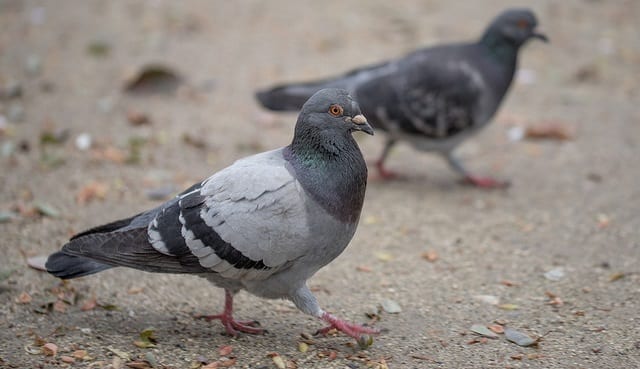
by Pigeon Patrol | Jun 21, 2023 | MBCA, pet bird, Pigeon Control, Pigeon Droppings, Pigeon Patrol's Services, Pigeon Predators
Pigeons are a very common species of bird in India. Pigeons can breed upto 8 times a year, therefore they are found everywhere. The word ‘pigeon’ comes from the Latin word called ‘pipio’, meaning ‘young chirping bird’. These young chirping birds love to create a mess and leave stinky droppings everywhere and anywhere.
Pigeons can sometimes be hard to deal with as they always wander in groups. They can mess your balcony or your vehicle. They can make consistent distracting noises which can give you a headache. They barge in your house and do not know how to leave. Pigeon droppings and nests can stink up a place. They can clog pipes, water-spouts etc. Read on to get rid of pigeons and their belongings.
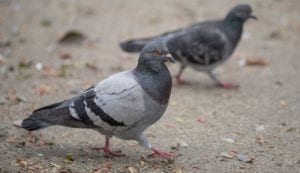
How to get rid of pigeons:
In India, pigeons are protected under Section 428 and 429 of the Indian Penal Code(IPC) (no wonder they are fearless). Even if this was not the case one must always go for non-violent options. So here is a list of the ways in which you can get rid of pigeons and their poop
Sound distraction:
You can hang wind-chimes at places prone to pigeons. They do not like it and as the chime moves and makes sound with the wind it kind of keeps the pigeons away and gives you a pigeon-free and melodious surrounding.
Reflecting surfaces:
Use shiny materials like aluminum foil or mirror to confuse the pigeons and keep them at bay. It plates tricks with their senses and keeps them off the place.
Professional bird nets or covering:
Pigeon nets for balconies are advised but try buying nets with smaller gap holes to avoid any invasions of pigeons.
Pigeon repellents:
You can use organic, home-made pigeon repellents. It can be effective in keeping pigeons away from the balcony or windows. (Providing you with a comparatively clean floor.)
Cover things up:
Pigeons can create a lot of mess out of open trash bins. Keep your trash covered if it is kept in an accessible place for pigeons to avoid any spill and mess.
Pigeons are not pets:
Pigeons are not pets and don’t treat them like one. Discourage people from feeding these nasty, parasite-carrying pigeons to stop them from coming back. Do not make them habitual of a place they can get food from as it will also become a place they use for frequent stinky white droppings.
Introduce fear:
It is said that pigeons are sort of taken aback by owls and snakes. You cannot get a real one but you can get a plastic owl or a rubber snake for your balcony or workspace, keep them in a corner most visited by the pigeons. It is a short-term trick to get rid of the pigeons.
Source
Pigeon Patrol Products & Services is the leading manufacturer and distributor or bird deterrent (control) products in Canada. Pigeon Patrol products have solved pest bird problems in industrial, commercial, and residential settings since 2000, by using safe and humane bird
deterrents with only bird and animal friendly solutions. At Pigeon Patrol, we manufacture and offer a variety of bird deterrents, ranging from Ultra-flex Bird Spikes with UV protection, Bird Netting, 4-S Bird Gel and the best Ultrasonic and audible sound devices on the market today.
Voted Best Canadian wholesaler for Bird Deterrent products ten years in a row.
Contact us at 1 877-4-NO-BIRD,(604) 585-9279 or visit our website at www.pigeonpatrol.ca
Pigeon/Pigeon Patrol / Pigeons Roosing / Vancouver Pigeon Control / Bird Spikes / Bird Control / Bird Deterrent / PIgeon Deterrent / Surrey Pigeon Control / Pest / Seagull deterrent / Vancouver Pigeon Blog / Birds Inside Home / Pigeons in the cities / Ice Pigeons / What to do about pigeons / sparrows, Damage by Sparrows, How to Keep Raccoons Away, Why Are Raccoons Considered Pests / De-fence / Pigeon Nesting / Bird Droppings / Pigeon Dropping / woodpecker control / Professional Bird Control Company / Keep The Birds Away / Birds/rats/seagull/pigeon/woodpecker/dove/sparrow/pidgeon control/pidgeon problem/pidgeon control/flying rats/pigeon problems/ bird netting/bird gel/bird spray/bird nails/bird guard












